|
|
|
Sort Order |
|
|
|
Items / Page
|
|
|
|
|
|
|
| Srl | Item |
| 1 |
ID:
086868
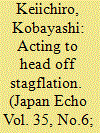

|
|
|
|
|
| Publication |
2008.
|
| Summary/Abstract |
Unlike the long slump Japan experienced in the 1990s, which was due to domestic causes, the economy's current problems are due almost entirely to exogenous factors. A supply-side shock may result in stagflation, to which macroeconomic fiscal and monetary policies will be powerless to provide a solution; the only practical response will be technological innovation. Japan should channel efforts into developing technologies that oil-producing nations will require over the long term
|
|
|
|
|
|
|
|
|
|
|
|
|
|
|
|
| 2 |
ID:
100538
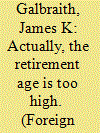

|
|
|
| 3 |
ID:
117870
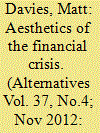

|
|
|
|
|
| Publication |
2012.
|
| Summary/Abstract |
The ways that financialization has contributed to the technocratic and antipolitical management of economies have become ever more evident in the wake of the financial crisis that commenced in the autumn of 2007. This bracketing and suspension of politics occurs in various ways but significantly, it does so through the obscuring of work as a moment of economic life. If economics has been complicit in this antipolitics, can an aesthetic approach to financialization shed light on how work is rendered invisible? This article analyzes four short film clips all distributed through YouTube to show not only how their visual and narrative elements organize subjectivities for an antipolitics of finance but also to find in the popular aesthetic a different "distribution of the sensible" that permits moments of suspension or rupture that can politicize financialized subjectivity and begin to recover a politics of work.
|
|
|
|
|
|
|
|
|
|
|
|
|
|
|
|
| 4 |
ID:
149823
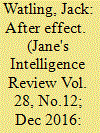

|
|
|
|
|
| Summary/Abstract |
Allied forces have begun the offensive to retake the northern Iraqai city of Mosul from the Islamic State. Reporting from Iraq, Jack Watling analyses how the successful recapture of the city will effect broader political and sectarian dynamics in the country.
|
|
|
|
|
|
|
|
|
|
|
|
|
|
|
|
| 5 |
ID:
123651
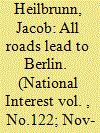

|
|
|
|
|
| Publication |
2012.
|
| Summary/Abstract |
BACK IN November 2011, as Europe struggled with its ongoing financial crisis, Poland's foreign minister, Radek Sikorski, gave a speech in Berlin that beckoned toward his country's western neighbor and pleaded with it to save the euro. "You know full well that nobody else can do it," said Sikorski. "I will probably be the first Polish foreign minister in history to say so, but here it is: I fear German power less than I am beginning to fear German inactivity. You have become Europe's indispensable nation."
|
|
|
|
|
|
|
|
|
|
|
|
|
|
|
|
| 6 |
ID:
099529
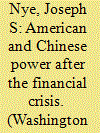

|
|
|
| 7 |
ID:
090605
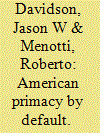

|
|
|
|
|
| Publication |
2009.
|
| Summary/Abstract |
American primacy continues to characterise the international system, despite trends toward a diffusion of power. The discussion is too often biased in favour of multipolarity due to imprecise or misleading definitions of US primacy. On the basis of a simple definition of what a "pole" is, combining GDP and defence expenditure, only the US can be considered a global pole. The current economic crisis is not changing this reality. Even considering perceptions, soft power, and the ability to translate power into influence, rising powers like China or an aggregate power like the EU have a long way to go before they can get on an equal footing with the United States.
|
|
|
|
|
|
|
|
|
|
|
|
|
|
|
|
| 8 |
ID:
086866
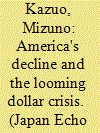

|
|
|
|
|
| Publication |
2008.
|
| Summary/Abstract |
Ten years of excessive consumption have severely weakened the balance sheets of American households. And housing prices are likely to drop much further than they already have, leading to more defaults on mortgages. Banks will have a tremendous load of bad loans to write off, and they will require injections of public funds. The US government will need to seek support from other countries, which may be reluctant to buy bonds denominated in dollars. The prospect of a dollar crisis is upon us.
|
|
|
|
|
|
|
|
|
|
|
|
|
|
|
|
| 9 |
ID:
085755
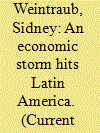

|
|
|
|
|
| Summary/Abstract |
hen the global financial and economic
crises erupted over the past year, there
was speculation that the Latin American
and Caribbean (LAC) region could insulate
itself substantially from external developments-
that the LAC countries could "decouple" themselves
from the recession in the United States and
other developed countries. In fact, while the LAC
region seems to be making it through the worldwide
storm better than it would have before the
twenty-first century, it has not decoupled itself
from the global economic situation.
|
|
|
|
|
|
|
|
|
|
|
|
|
|
|
|
| 10 |
ID:
093367
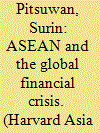

|
|
|
| 11 |
ID:
104101
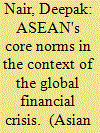

|
|
|
|
|
| Publication |
2011.
|
| Summary/Abstract |
Has the global financial and economic crisis provided stimulus for institutional development in ASEAN? Exploring the empirical trends concerning ASEAN's plans for a comprehensive community by 2015, it is a argued that no such developments have emerged. Instead, two alternative sources for potential change in ASEAN's institutional norms are elaborated
|
|
|
|
|
|
|
|
|
|
|
|
|
|
|
|
| 12 |
ID:
133563
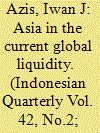

|
|
|
|
|
| Publication |
2014.
|
| Summary/Abstract |
In contrast with the pre~1997/98, today's emerging Asia registers excess savings. Since early 2000s, the liquidity was further boosted by in?ows of capital including those going through the banking sector. After a brief, yet sharp, interruption at the beginning of the global ?nancial crisis, in?ows resumed albeit of different form and inducted by different agents. Nonetheless, the global liquidity sphere has clearly changed. When the quantitative easing tantrum began in May last year, volatility returned. Largely due to a lack of innovative policy response, the episode of vacillating flows produced repercussions not different than in the past because the incentive system remains unchanged. Consequendy, vulnerability still rises with capital ?ows. The 'rational' response of agents is equally predictable, raising the risk of financial instability and exacerbating the already widening income disparity. Nothing is fundamentally new, everyone continues to "dance with the system."
|
|
|
|
|
|
|
|
|
|
|
|
|
|
|
|
| 13 |
ID:
093406
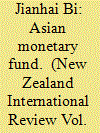

|
|
|
| 14 |
ID:
113135
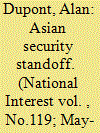

|
|
|
| 15 |
ID:
086452
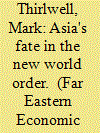

|
|
|
|
|
| Publication |
2009.
|
| Summary/Abstract |
If 2008 was the year of the global financial crisis, 2009 is turning out to be the year of the real economy fallout: a case of Après Lehman, le déluge. It now seems almost unavoidable that 2009 will see the world economy contract in real terms, producing the worst performance for global growth since World War II. International trade and capital flows have been falling so precipitously that deglobalization is threatening to replace globalization as the best description of our current international economic environment. Soft protectionism-in the form of local content provisions and financial mercantilism-is on the rise. Commodity prices have crashed. Unemployment is climbing, as is social unrest, and governments have started to topple.
|
|
|
|
|
|
|
|
|
|
|
|
|
|
|
|
| 16 |
ID:
101096
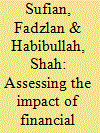

|
|
|
|
|
| Publication |
2010.
|
| Summary/Abstract |
The paper seeks to examine the determinants of Indonesian banks profitability during the period 19902005. The empirical findings indicate that income diversification and capitalization are positively related to bank profitability, while size and overhead costs exert negative impacts. During the period under study, Indonesian banks seem to have been skimping on their resources, particularly during the pre-crisis and crisis periods. The impact of economic growth and banking sector concentration are positive during the pre-crisis and crisis periods. We find that the Asian financial crisis exerts negative and significant impact on the profitability of Indonesian banks, while Indonesian banks have been relatively more profitable during the pre-crisis compared to the post-crisis and crisis periods.
|
|
|
|
|
|
|
|
|
|
|
|
|
|
|
|
| 17 |
ID:
088853
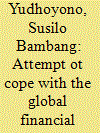

|
|
|
| 18 |
ID:
131424
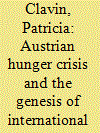

|
|
|
|
|
| Publication |
2014.
|
| Summary/Abstract |
From its foundation in 1918, the new Austrian republic was gripped by famine and a crisis of confidence in its currency that threatened to tip the new state into hyperinflation and revolution. This article shows how western efforts to aid Austria combat famine and its financial crisis were linked, and how they had a profound impact on the new League of Nations, the world's first multi-purpose intergovernmental organization. It also demonstrates the importance of the incipient wartime international bureaucracy for League agency. Contrary to the expectations of its architects, member governments, international financiers, businessmen and economists began to see the League as a useful tool to meet common needs that today would be called the search for human security. The article demonstrates how the Austrian food and financial crisis was the founding moment in the institutionalization of international economic and financial coordination, cooperation and oversight. It established the Economic and Financial Organization of the League of Nations, whose work would later inform its successors, the International Monetary Fund, the World Bank and the European Union. The study speaks to the ways in which the notion of security has broadened in the past two decades to embrace economic, social, political and environmental concerns. But the notion of 'human security' is not new; it was written into the body of the League.
|
|
|
|
|
|
|
|
|
|
|
|
|
|
|
|
| 19 |
ID:
124869


|
|
|
|
|
| Publication |
2013.
|
| Summary/Abstract |
The wide-ranging varieties of capitalism literature rests on a particular conception of banks and banking that, the authors argue, no longer reflects the reality of modern financial systems. They take advantage of the greater information regarding bank activities revealed by the financial crisis to consider the reality, across eight of the world's largest developed economies, of the financial power of banks to act as bulwarks against market forces. This article offers a marketbased banking framework that transcends the bank-based/capital market-based dichotomy that dominates comparative political economy's consideration of financial systems and argues that future cpe research should focus on the activities of banks. By demonstrating how market-based banking increases market influences on the supply of credit, the authors highlight an underappreciated source of financial market pressure on nonfinancial companies (nfc s) that can have a potential impact across the range of issues that the varieties of capitalism (VoC) literature has seen as differentiating national systems. This approach has implications in areas such as labor, welfare, innovation, and flexibility.
|
|
|
|
|
|
|
|
|
|
|
|
|
|
|
|
| 20 |
ID:
099577
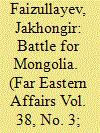

|
|
|
|
|
| Publication |
2010.
|
| Summary/Abstract |
The Russian leaders have been stepping up efforts in recent years to promote political and economic cooperation with Mongolia. Following the breakup of the U.S.S.R., Russia's positions on the Mongolian market have weakened gradually, to a point where it has been forced to fight back for the niche it has lost, now against very strong competition from other countries' leading companies.
|
|
|
|
|
|
|
|
|
|
|
|
|
|
|
|
|
|
|
|
|